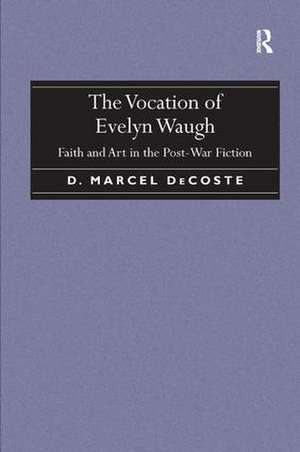The Vocation of Evelyn Waugh: Faith and Art in the Post-War Fiction
Autor D. Marcel DeCosteen Limba Engleză Hardback – 28 mai 2015
| Toate formatele și edițiile | Preț | Express |
|---|---|---|
| Paperback (1) | 389.66 lei 6-8 săpt. | |
| Taylor & Francis – 12 dec 2019 | 389.66 lei 6-8 săpt. | |
| Hardback (1) | 765.36 lei 6-8 săpt. | |
| Taylor & Francis – 28 mai 2015 | 765.36 lei 6-8 săpt. |
Preț: 765.36 lei
Preț vechi: 1103.45 lei
-31% Nou
Puncte Express: 1148
Preț estimativ în valută:
146.45€ • 153.29$ • 121.89£
146.45€ • 153.29$ • 121.89£
Carte tipărită la comandă
Livrare economică 31 martie-14 aprilie
Preluare comenzi: 021 569.72.76
Specificații
ISBN-13: 9781409470847
ISBN-10: 1409470849
Pagini: 196
Dimensiuni: 156 x 234 x 18 mm
Greutate: 0.52 kg
Ediția:1
Editura: Taylor & Francis
Colecția Routledge
Locul publicării:Oxford, United Kingdom
ISBN-10: 1409470849
Pagini: 196
Dimensiuni: 156 x 234 x 18 mm
Greutate: 0.52 kg
Ediția:1
Editura: Taylor & Francis
Colecția Routledge
Locul publicării:Oxford, United Kingdom
Cuprins
Deplorable design, divine providence: Brideshead Revisited and the callings of Charles Ryder. The plasticity of the human: the death of art in The Loved One and Love Among the Ruins. 'A single peculiar act of service': Helena and the stylish pilgrimage of factual faith. The man of letters in middle age: secular perdition and ecclesial art in Scott-King's Modern Europe and The Ordeal of Gilbert Pinfold . 'It's sauve qui peut now': art's death wish and charity's vocation in the War Trilogy.
Notă biografică
D. Marcel DeCoste is Associate Professor of English at the University of Regina, Canada, where he teaches twentieth-century British and American literature. He has published and presented widely on Waugh's work.
Descriere
Arguing against the critical commonplace that Evelyn Waugh’s post-war fiction represents a decline in his writerly powers, D. Marcel DeCoste analyzes Waugh's major works from Brideshead Revisited to Unconditional Surrender. As DeCoste shows, Waugh offers in these later works an under-remarked meditation on the dangers of aestheticism in the context of modern secularism, forging in the second half of his career a literary achievement that both narrates and enacts a more Catholic literary vocation.
